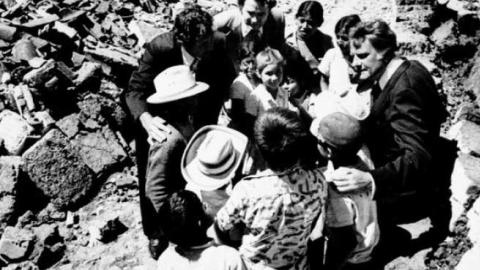Most Americans are acquainted with evangelical advocacy on controversial social issues, but few have any idea what evangelicals—who make up around a quarter of the U.S. population—think about other topics. Among those topics: global affairs.
In “To Bring the Good News to All Nations,” diplomatic historian Lauren Turek offers a sophisticated survey of how evangelicals think about foreign relations by showing how this amorphous, decentralized group has applied its theology to human rights and has developed advocacy and policy organizations during the Cold War and its aftermath. The book begins with international Christianity wrestling with the implications of postwar decolonization. Many church leaders in U.S. mainline Protestant denominations denounced Western missionaries’ alleged imperialism and turned to social activism in their mission work. Evangelicals, though always engaged in humanitarian projects, continued to proselytize abroad—or preach the Gospel, as they would put it. Disagreement between the mainliners and evangelicals came to a head during the 1968 World Council of Churches assembly.
Billy Graham and other evangelical leaders hosted the Lausanne Conference in 1974 to discuss evangelistic strategy and promote collaboration between the various evangelical organizations. The conference’s planners, aware that Christianity’s demographic center was rapidly shifting away from the United States and Europe, invited mostly non-Westerners. C. René Padilla, for example, an Ecuadoran theologian, criticized Western evangelical missionary efforts for paying insufficient attention to social justice; the conference’s Lausanne Covenant, though insisting on the centrality of religious conversion, encouraged evangelical missionaries to give indigenous leaders autonomy.
Evangelicals converted millions in the next few years. Some denominations, like the Southern Baptists, transitioned many missions to local leadership and focused American missionaries on areas with few Protestant Christians. The ties formed between U.S. and foreign churches brought human-rights issues to the attention of American congregations, who heard from their missionaries firsthand about the oppression and cruelty inflicted on far-flung Christians and their neighbors. In areas where missionaries were banned, evangelicals used radio broadcasts and satellite communications to convey their message, as well as old standbys like Bible-smuggling.
Ms. Turek shows with clarity and nuance how their theology shaped evangelicals’ philosophy and policy preferences. As their international outlook broadened, evangelicals created organizations to promote their philosophy of human rights. They believed freedom of conscience to be the most important of those rights, God having endowed each human with intrinsic dignity. They tended to support anticommunist leaders, even if authoritarian, because it was mainly the communists who persecuted the church. Still, although their belief in original sin made them realistic about the intractability of many problems, evangelicals were never hard-hearted realists. After an earthquake in Guatemala killed 23,000 and left a million homeless in 1976, evangelicals in the U.S. responded so rapidly that the Ford administration told potential donors to send their aid through church groups.
Having related how evangelicals developed an interest in global affairs, the book turns to their influence on American policy. The 1974 Jackson-Vanik amendment pressuring the Soviets to let persecuted Jews emigrate inspired evangelicals to petition the U.S. government for religious freedom behind the Iron Curtain. Through letter-writing campaigns, political endorsements and lobbying, evangelicals advocated protecting Soviet Christians. Jimmy Carter, despite himself professing evangelical faith, pursued few evangelical priorities abroad. Evangelicals welcomed the Reagan administration’s assertiveness on Soviet human-rights abuses, although they pushed sanctions on Romania through Congress despite Reagan’s policy of encouraging daylight between the Soviet Union and its satellites.
In Guatemala, evangelicals defended a dictator, José Efraín Ríos Montt, whose actions appalled other American human-rights organizations. After the earthquake in 1976, Protestants grew from about 7% of the Guatemalan population to over 22% in 1982, many of whom were evangelical. Among them was Ríos Montt, a retired general who seized power in March 1982 and launched a “Project David” good-governance campaign but also a “Rifles and Beans” counterinsurgency program that left 86,000 dead or missing and created a million refugees. Convinced that Ríos Montt’s faith made him a better leader than the alternatives, evangelicals supported him on Capitol Hill and raised funds for him long after other human-rights groups opposed him. (To their credit, evangelicals continued to pour in humanitarian donations even after Ríos Montt lost power.)
Notoriously skeptical of hierarchies, evangelicals have created a dense thicket of overlapping charities, churches and nonprofits that can defy even the doughtiest analyst. Many observers retreat to quoting a few familiar names, but Ms. Turek’s nuanced understanding of American religious networks gives the reader a much fuller account of how the evangelical world works. This can sometimes require frequent visits to the two-page acronym index, but it’s not Ms. Turek’s fault that evangelical institutions bear unwieldy names like ICOWE, WEFCC and IRCEBCSU.
Evangelicals don’t always agree with secular human-rights organizations, and they can enrage one another. But at a time when voters have turned away from a robust internationalism—both the Obama and Trump administrations have adopted different forms of retrenchment—evangelicals could be powerful advocates for U.S. engagement abroad. The international human-rights lobby might try to tap that source of strength again, if it wants to have a prayer.
Read in Wall Street Journal



















